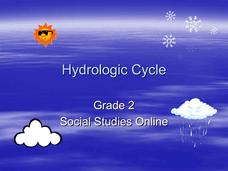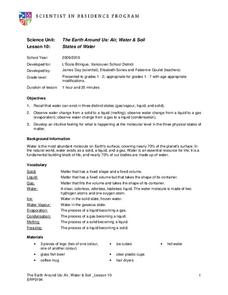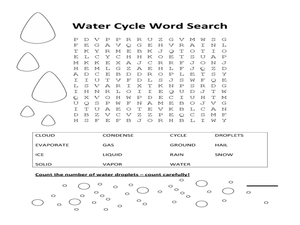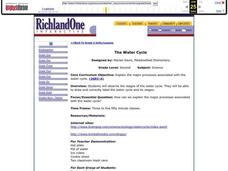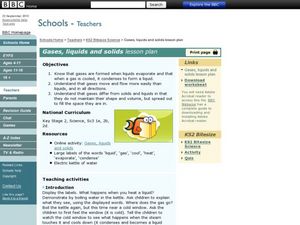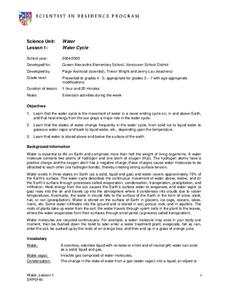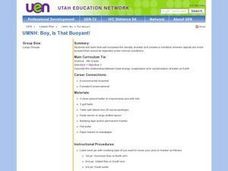National Park Service
The Water Cycle Game
Take young scientists on a trip through the water cycle with this interactive science activity. After setting up a series of ten stations representing the different places water can be found, children use the included printable dice to...
Curated OER
Hydrologic Cycle
This water cycle PowerPoint includes information based on the parts of the cycle and their purposes. Slides feature facts and examples of evaporation, condensation, and precipitation in text and visual formats.
Curated OER
Water Cycle
In this water cycle activity, students draw a picture and write a short story. In this fill in the blank and essay activity, students complete two activities.
Curated OER
States of Water
Students investigate the 3 states of matter. In this physical science "matter" lesson, students observe and participate in a number of demonstrations involving melting and freezing water. Students observe the effect heat has on changing...
Curated OER
The Great Melting Race
Students show their knowledge by choosing the correct answer about solids, liquids and gases. Students also write short answer responses to questions about experiments they have done.
Curated OER
Thermochemistry
In this thermochemistry worksheet, students indicate whether the given processes are endothermic or exothermic reactions. Students complete the phase change diagram as well as define a given set of vocabulary words. Students calculate...
Curated OER
The Water Cycle
Students simulate the water cycle. In this water cycle instructional activity, students create a model of the water cycle. Students draw the water cycle and write a paragraph explaining their drawing.
Curated OER
Water, Water, Everywhere!
Students complete a WebQuest. In this water cycle lesson plan, students investigate the cycle through a WebQuest activity. Students research the water cycle through Internet resources and create a documentary video of their process.
Curated OER
Gases, Liquids And Solids
Students investigate how gases are different from solids and liquids and that they can evaporate and condense. They observe water boiling in a teapot and discuss what happens when the steam touches a cold window, complete an online Heat...
Curated OER
Physical Changes and the Water Cycle- Three
Third graders take note of the changes in the water level in a cup of water that is left out. Using a model of the water that depicts a lake and landscape that is being heated by a heat lamp, the students observe precipitation, and...
Virginia Department of Education
Heat and Thermal Energy Transfer
How does radiation affect our daily lives? Answer that question and others with a lesson that discusses radiation and its use in thermal energy transfer through electromagnetic waves. Pupils investigate vaporization and evaporation while...
Curated OER
Water Cycle in a Bag
Middle schoolers participate in a hands-on activity that demonstrates how the water cycle functions. Students look specifically at condensation and evaporation during the recycling of water.
Curated OER
Earth Processes
Fourth graders explore and discuss the process of evaporation. They discuss how wet things become dry. Students observe the process of evaporation and they make predictions about the observations they make about evaporation. Students...
Curated OER
Fresh Water From the Oceans?
Young scholars participate in an activity in which they demonstrate how the evaporations of water from the oceans results in fresh water in the form of rain. They create a saltwater solution in a flask and boil the water until most of...
Curated OER
States of Matter
Students categorize items into one of the three states of matter. They participate in a demonstration in which they represent particles of matter. Finally, they complete an experiment in which they "race" top see who can make acetone...
Curated OER
Waterdrops Water Cycle
In this earth science activity, learners read an article about the water cycle. Then they continue the story about the travels of a water droplet through time and space. Students also complete sentences by writing in the correct word...
Curated OER
The Water Cycle
Second graders conduct an a water cycle experiment. For this water cycle lesson, 2nd graders observe a puddle of water, they predict how it got there and what will happen to it. Students watch a demonstration on the water cycle and...
Curated OER
Mini Water Cycle
In this water cycle worksheet, learners create a mini version of the water cycle in a plastic bag by observing the bag for 5 days. Each day students draw a picture of how their bag looks and write an explanation of what they see. Next,...
Curated OER
Gases, Liquids and Solids, evaporate, shape volume,
Students conduct an online experiment to discover what happens to solids, liquids and gases in different temperatures. In this states of matter lesson plan, students get into pairs and work in a virtual laboratory to manipulate heating...
Curated OER
The Water Cycle in a Bowl
Students conduct an experiment on the stages of the Water Cycle. In this water cycle lesson, students view the materials needed for the experiment and brainstorm how they relate to the Water Cycle. Students conduct an experiment where...
Curated OER
Physical Changes and the Water Cycle - Three
Third graders observe and reproduce the water cycle in their very own classroom. A simple, yet very effective, demonstration on how water evaporates is observed by the young scientists. They make observations and sketches in their...
Curated OER
Water Cycle
Young scientists explore Earth elements by conducting an experiment. They define water vocabulary terms such as condensation and precipitation. In addition, they conduct a water experiment in which they build a terrarium, so they can...
Curated OER
"Tri-County" Project--Water Cycle
Learners analyze the parts of the water cycle through research and experimentation. Particular attention is paid to the processes of evaporation and condensation.
Curated OER
Boy, Is That Buoyant!
Fourth graders see that salt increases the density of water and creates a condition wherein objects are more buoyant than would be expected under normal conditions. They describe the relationship between heat energy, evaporation and...



